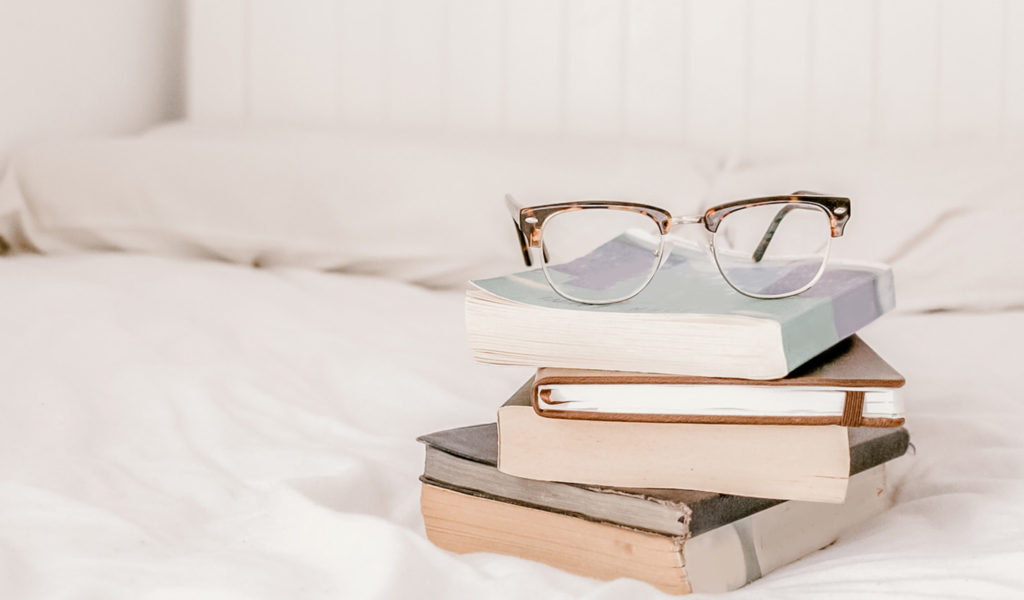I’m Ayana, aka @auntieayana on Instagram! I’m currently a 4th-year student studying graphic design in the San Francisco Bay Area. For the past couple of years, I’ve used my design skills and passion for advocating for people and the environment to share information on living sustainably with my audience on Instagram. I share products, brands, and services that help us reduce the amount of waste we produce and give us an alternative to lining the pockets of huge corporations.
My passion for the environment and effort to live low-waste came from my dad’s minimalist practices during my childhood. He always encouraged my brothers and I to take care of and use what we had. We kept our home clutter-free, ate leftovers instead of wasting food, and we never really had more than what we really needed. He may not have had the environment in mind when raising us in this way, but as I grew older and learned the connection between minimalism, conscious consumerism, and the environment, I realized how important it was to limit my negative impact on the planet. Especially as a woman of color, I feel it’s important to bring awareness to the damage being done and the people (primarily those of color) who are being affected by climate change.
I’ve gained so much knowledge from zero waste and minimalist books over the years. I really appreciate that people living this lifestyle are so open to sharing their tips and advice, creating a community of more eco-conscious people. I believe it’s important to share our knowledge in order to make the world a better place!
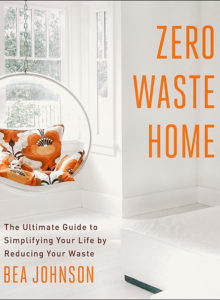
Source: zerowastehome.com
Zero Waste Home: The Ultimate Guide to Simplifying Your Life by Reducing Your Waste – Bea Johnson
Johnson’s Zero Waste Home is one of the most comprehensive sources of guidance available if you want to generate less waste. Fully deserving of its place as a Number 1 bestseller on Amazon, this tour-de-force of zero-waste home improvement has been translated into more than 25 languages and has helped families to make their homes more environmentally friendly across the globe.
Exploring the five Rs – Refuse, Reduce, Reuse, Recycle and Rot – Johnson offers her readers a practical guide to each room of the house, offering incredibly detailed advice on how to mitigate waste. Whether you’re looking to reduce the packaging from your groceries, or for a recipe for bronze-cleaner using only ingredients found in the pantry, this book offers incomparable support for zero-waste beginners.
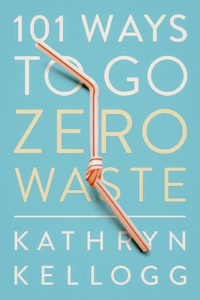
Source: goingzerowaste.com
101 Ways to Go Zero Waste – Kathryn Kellogg
This lightweight and easily digestible zero-waste book is a fantastic source of inspiration to get you started on your zero-waste journey. Offering plenty of practical tips on how to go low-waste in handy bite-size chunks, Kellogg’s book is a wonderful way to start building a zero-waste lifestyle. Providing useful suggestions in a lightweight style, this is the perfect book to keep next to the bath, or to take with you on your commute.
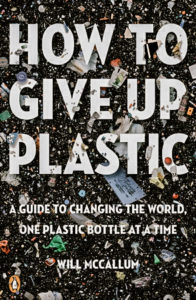
Source: penguinrandomhouse.com
How to Give Up Plastic: A Guide to Changing the World, One Plastic Bottle at a Time – Will McCallum
How to Give Up Plastic holds a plenty of valuable insights into how we can reduce our waste single-use plastic consumption at all levels of society. McCallum’s book provides useful suggestions for how we can reduce our plastic at home and in our workplaces.
He then goes on to place these changes into the vital, broader context, explaining the impact of plastic consumption at a global level, and provides strategic guidance on how we can work with community and business leaders to implement the wide-scale change that we really need to see a plastic-free world.
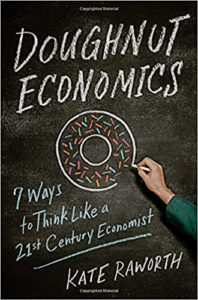
Source: amazon.com
Doughnut Economics – Kate Raworth
Raworth’s hard-hitting academic account provides a deep and cutting analysis of why our current economic systems are failing us socially and ecologically, and how creating closed-loop systems can help us out of crisis.
Exploring the relationship between our linear economy, social inequality, and environmental degradation, Raworth provides a chilling account of our current situation, paired with an inspiring and innovative alternative economic model. If you’re looking for a deep, statistically driven understanding of why the zero-waste movement and closed-loop systems are so vital for our social and ecological survival, this is the book for you.
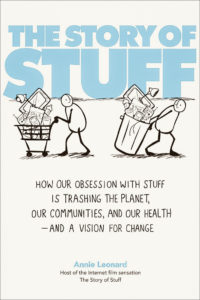
Source: storyofstuff.org
The Story of Stuff – Annie Leonard
This detailed exploration of consumerism and overconsumption has been developed from a 2007 documentary by the same name. It takes a dive into the damage caused by our linear model of consumerism; exploring the direct environmental and social impacts of each stage of production between extraction and disposal.
Armed with statistics, anecdotes and experience, Leonard’s compelling account illuminates the urgency with which we need to alter our current systems of consumption—basically how to live with less stuff!
However, it’s not all doom and gloom. Her book also offers insight into how we can work as individuals, businesses, and governments to create a socially equitable and ecologically sustainable future by creating closed-loop systems of production.
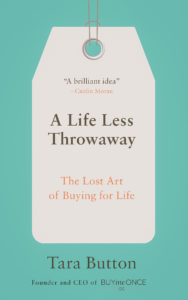
Source: amazon.com
A Life Less Throwaway: The Lost Art of Buying for Life – Tara Button
This wonderful book acts as your personal guide into “Mindful Curation”, a practice of deeply conscientious consumption. This book takes a careful journey into the individual’s psychological relationship to consumerism and lays out a practice by which we can break away to nurture a minimalist, zero-waste lifestyle.
By examining the socially enforced habits and mentalities of consumerism, Button guides her readers through their journey towards “Mindful Curation”, a framework which means only buying and possessing those products which are essential, durable, and which will stay beautiful for the longest time. This is an excellent book for the zero-waste aesthetician.
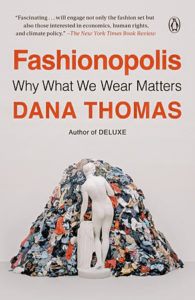
Source: penguinrandomhouse.com
Fashionopolis: The Price of Fast Fashion – Dana Thomas
Fashionopolis explores the dark underbelly of the fashion industry, exposing the social and ecological dangers created by the mass-production and rapid-disposal of clothing.
Examining the impact of sweatshops on the livelihoods of those who work in them, and the environmental impact of polluting factories and mass landfill of clothing, Thomas makes a strong case of our need for “slow” fashion, and cradle-to-cradle (or closed-loop) systems of clothing production.
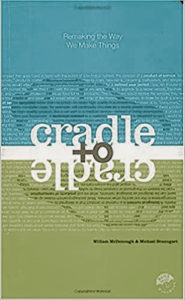
Source: amazon.com
Cradle-to-Cradle: Remaking the Way We Make Things – Michael Braungart and William McDonough
A seminal book for the zero-waste movement, Cradle to Cradle advocates for an innovative design framework which prioritizes closed-loop, diverse systems of production, running on reusable energy. This technically detailed and scientifically thorough book provides a range of examples as to how our global ecology and economy can work together; creating self-sustaining systems in which “waste” no longer is an element.
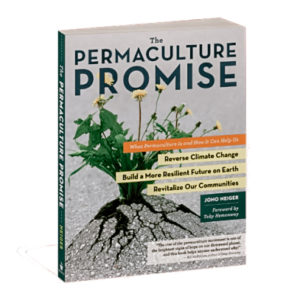
Source: permaculturepromise.com
The Permaculture Promise – Jono Neigher
The Permaculture Promise is a wonderfully written introduction to permaculture, and the potential that this eco-friendly school of design offers. It demonstrates how, by integrating permaculture’s zero-waste principles into our societies, we can build a more resilient human ecosystem for all.
It’s an inspirational text, full of wonderful examples of how we can use closed-loop systems to reinvigorate depleted soil, revitalize struggling communities, renovate inefficient homes, and reclaim independence from centralizing sources of power. Whether this book sits on your coffee table, or acts as a well-thumbed and well-noted checklist, it can help you integrate zero-waste systems into all aspects of your life.
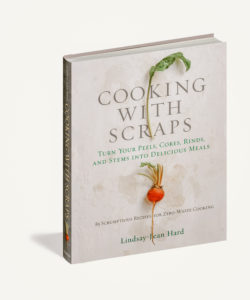
Source: workman.com
Cooking with Scraps – Lindsay-Jean Hard
We all know that composting offers an invaluable opportunity to utilize food waste, but did you know that we can eat a large amount of what is often thrown away? Hard’s inspirational cookbook offers 85 suggestions for how we can feed ourselves using unexpected parts of the food we eat! From carrot-green pesto to bean-water vegan mayo, this zero-waste cook book will help you move towards your sustainability goals in the most delicious way possible. You can also check out their blog for more ideas!
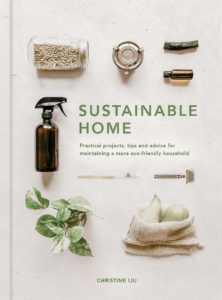
Source: amazon.com
Sustainable Home by Christine Liu
Sustainable Home is both inspirational and practical – offering tips, tricks, and 18 step-by-step projects designed to help you lead a more low-impact lifestyle. Looking to start your low-waste journey but aren’t sure where to start? This book will serve as your guidebook to maintaining a more environmentally friendly household!
Zero-waste reading
You don’t need to wait until you’ve read these books to take a first step towards your zero-waste reading journey. By buying these books (or any others) locally, second hand, or even as an ebook, you can go a long way to mitigating the waste and environmental cost associated with publishing.
For more information on how avid readers can keep their carbon footprint low, and how to work towards your zero-waste goals elsewhere in your life, check out the Zero Waste Blog!

